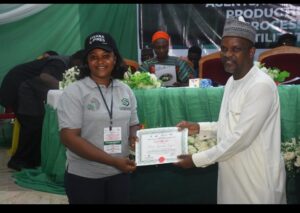


NPC L-PRES, Alhaji Sanusi Abubakar (right) presenting the certificate of participation to Mrs. Folake Iseyemi Kwara GBV Specialist in Ilorin
By correspondent in Ilorin.
Kwara State has undertaken a significant effort to bolster agricultural productivity by training more than 100 extension agents and farmers in small ruminant production and crop residue processing. This initiative aims to optimize ruminant feed resources for improved meat production.
Participants were selected from all 16 local government areas of the state, with the goal of enhancing food security within Kwara and across Nigeria. The program, spearheaded by the Kwara State government through the State Livestock Productivity and Resilience Support Project (L-PRES), received support from the Centre for Dryland Agriculture (CDA) and the World Bank.
During the opening ceremony in Ilorin, Dr. Aliyu Sabi Abdullahi, Minister of State for Agriculture and Food Security, underscored the pivotal role of extension agents and farmers in raising awareness and enhancing livestock productivity. Represented by Mallam Abubakar Sanusi, National Project Coordinator for L-PRES, the minister emphasized that sensitization efforts are crucial, contributing significantly to animal feasibility studies.
The Minister urged extension agents to collaborate closely with farmers to boost livestock productivity, highlighting Kwara as one of 20 states engaged in the L-PRES initiative aimed at advancing animal production and pasture development in partnership with research institutions.
Oloruntoyosi Thomas, Commissioner for Agriculture and Rural Development, announced plans to train over 1,000 extension agents in the next two years and provide each local government area with a motorcycle to support operational efficiency.
Expressing gratitude, participant Oyeleke Raufu commended the organizers for a comprehensive training program covering crucial aspects of small ruminant rearing, utilization of farm waste for animal feeds, and meat production, among other agricultural value chains.
Edited by Dada Ahmed.

